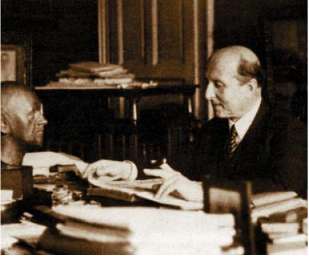Βλέπετε την παλαιά ιστοσελίδα
του τμήματος φυσικής
που ίσχυε έως και 23/3/2024
-
Νέα ιστοσελίδα: https://physics.uoi.gr
The training of Physicists aims on the one hand to equip its recipients with the basic knowledge of physical phenomena (Mechanics, Electromagnetism, Modern Physics, etc.) in both theoretical and observational ends, and on the other hand, to teach them the methodology of Physics for the solution of old and new problems. In the current undergraduate studies programme there is a co-existence of compulsory courses which give more emphasis to methodology, and optional courses which give more emphasis to new knowledge and applications. Moreover, there are courses which cover techniques and technologies required in Physics, like computers, mathematics and experimental methods.

Constantin Carathéodory, founder of Thermodynamics
The bulk of the Physics Department graduates is channeled to the Secondary Education. Besides the dedication required for the successful accomplishment of the teacher's duties, knowledge of the field which will be transferred to the students is mainly required. A Physics teacher has the important responsibility to teach the methodology of Physics and not only to transfer some Physics knowledge.
Other career avenues for the Physics Department graduates are various fields of applied Physics in the frame of Industry or of big state (or otherwise) organizations like the National Telephone Organization, National State Electricity Company, National Meteorological Service, etc. Such fields are Radio-electrology, Telecommunications and Optical Communications, Meteorology and Climatology, Medical Physics etc. Most of these fields require postgraduate studies degrees.
Our Department offers postgraduate studies in the most basic fields of Physics like Theoretical Physics, Photonics, New Materials, Electronic Technologies, Meteorology and Climatology and the Didactics of Physics, which after a series of core postgraduate courses lead to a postgraduate degree.
The Postgraduate Programme of the Department leads also to Philosophy Degrees in Physics after the preparation of an original dissertation on a current research topic. The majority of Ph.D. holders is seeking an academic career in Universities and Research Centers of the country or abroad. They are not only assigned with teaching or applying existing knowledge but also with generating new knowledge via scientific research.
Progress in Physics is almost always the result of laborious and lengthy work of many individuals. Irrespectively of the method of approach and work for any given problem, a common characteristic of the Physicist is an ethical approach to his/her Science. It is the duty of the Physicist not only to advance our understanding of the Physical Cosmos with the aid of scientific methodology, but also to nourish scientific ethics and to spread the scientific method. In a rapidly evolving world, with technology acquiring an ever-increasing role, with Information increasing exponentially and specialization becoming extremely demanding, the Physicist is the trustee of the scientific method. His/her goal continues to be the understanding of our Cosmos, as it was for the Ionian philosophers, and his/her method is the Observation and Logic.